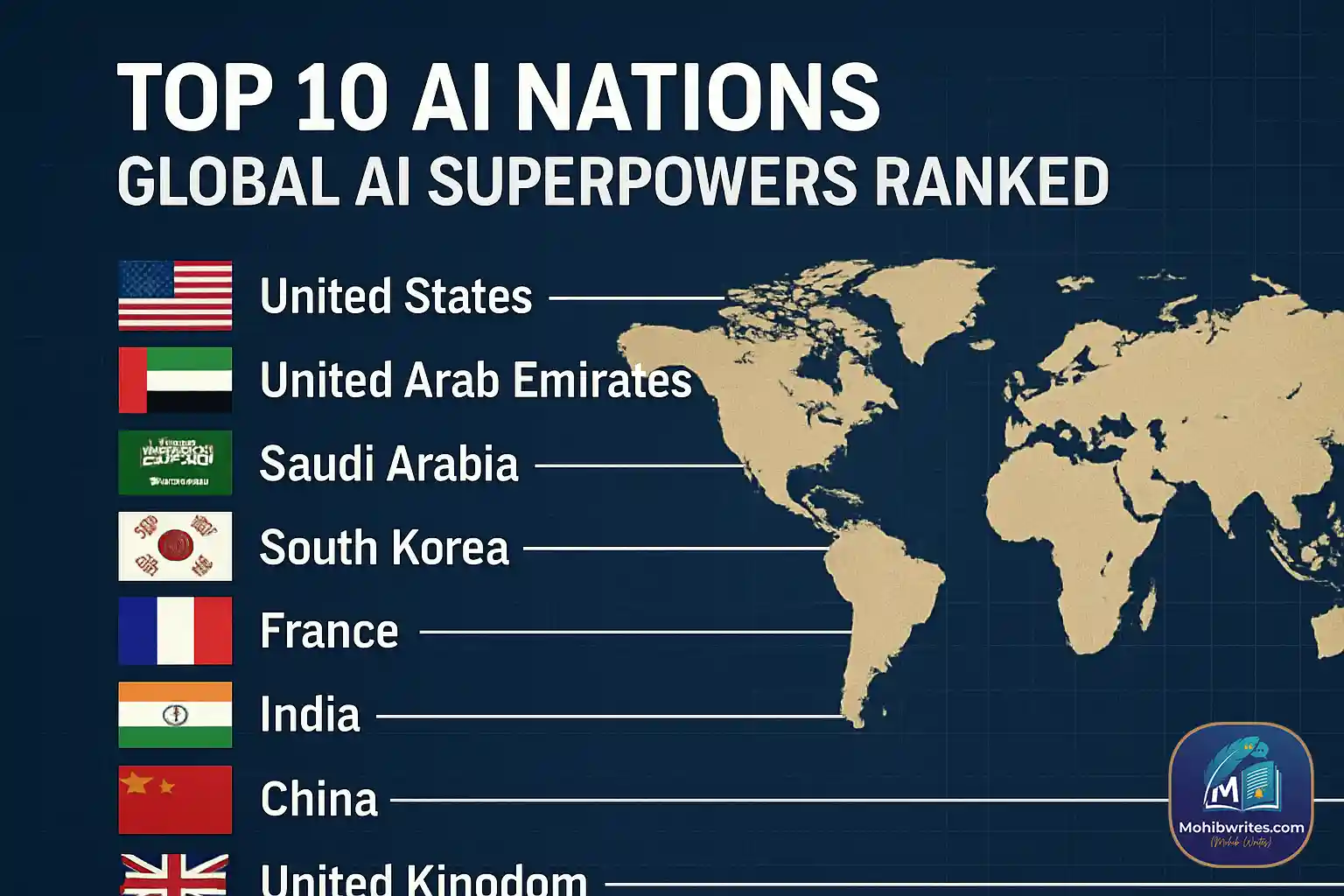Top 10 AI Nations 2025: the United States remains the global leader by raw AI compute (roughly half of global H100-equivalent capacity), while China tops the world for number of AI clusters — here’s the short, evidence-backed ranking and why it matters.
The ranking you need
Why this ranking?
TRG Datacenters (using the Epoch AI dataset) ranks countries by compute capacity (H100 equivalents), cluster counts, and power capacity — a blended view of raw compute, infrastructure and readiness. [source]
Top compute by H100-equivalents:
USA: ~39.7 million H100 equivalents (~50% global compute). [Source]
UAE: ~23.1 million H100 equivalents (surprising #2). [source]
Saudi Arabia, Korea, France, India, China, UK, Finland, Germany follow in the TRG compute list with differing magnitudes. See TRG for full table. [source]
Top clusters by count:
China leads with ~230 AI clusters; the U.S. follows with ~187 clusters — cluster count ≠ compute parity (China has many clusters but smaller compute per cluster). [source]
Why the U.S. still “wins” — and why it matters
Raw compute and power
The U.S. concentrates the largest share of heavy training compute and power capacity — enabling large model training and fast iteration cycles.
Cloud & hyperscalers
Big cloud players (Microsoft, Google, AWS) host huge fractions of this compute, magnifying U.S. influence over global AI access and pricing.
Policy and investment
Heavy private capital + favorable infrastructure investment allow rapid scaling of AI datacenters, but geopolitical supply-chain limits (chips, trade controls) reshape how compute is distributed.
Why China has more clusters — and what that implies
Many clusters, less H100-equivalent compute per cluster.
China’s ~230 clusters often run on different accelerators and optimized systems — quantity plus algorithmic efficiency is a strategic advantage when raw chips are constrained.
Algorithm & efficiency focus.
Limited access to some western chips has pushed Chinese labs to optimize models and inference costs — you’ll see different innovation tradeoffs compared to pure compute-heavy training strategies.
Surprise entrants: UAE & Saudi Arabia (why they rank high)
Oil-wealth + sovereign investment is funding hyperscale data centers and power;
TRG shows the UAE and Saudi Arabia punching above their weight in compute capacity — an outcome multiple outlets flagged as unexpected.
This is strategic national investment into future tech and data-center power.
Top 10 AI Nations 2025 shows the U.S. leading in raw compute, China leading in cluster count, and oil-rich Gulf states rising fast thanks to big infrastructure investments.
For strategies: invest in compute-efficient models, secure chip supply, and build local AI talent.
FAQs (People Also Ask)
Which country is no. 1 in AI?
The U.S. ranks #1 by raw AI compute capacity in the TRG/Epoch analysis (about half of global H100-equivalent compute).
Is the US number 1 in AI 2025?
Yes — by compute power and data-center power capacity; but rankings differ if you measure clusters, talent or regulation.
What is China's rank in AI?
China ranks high in cluster count (largest number of AI clusters) but lower in raw H100-equivalent compute due to chip/access constraints.
Which countries are winning the AI race?
Winners depend on metrics: the U.S. (compute), China (clusters & optimization), UAE/Saudi (infrastructure investment), plus Korea, France, India for niche strengths.
Which country uses ChatGPT most?
Usage varies by market data (OpenAI/analytics firms). We focused in this article on infrastructure; for ChatGPT usage stats we should pull web analytics or polling data.
Where is AI most successful?
Across countries with high compute, dense talent pools and active corporate adoption — notably parts of the U.S., China, Korea and Western Europe.







